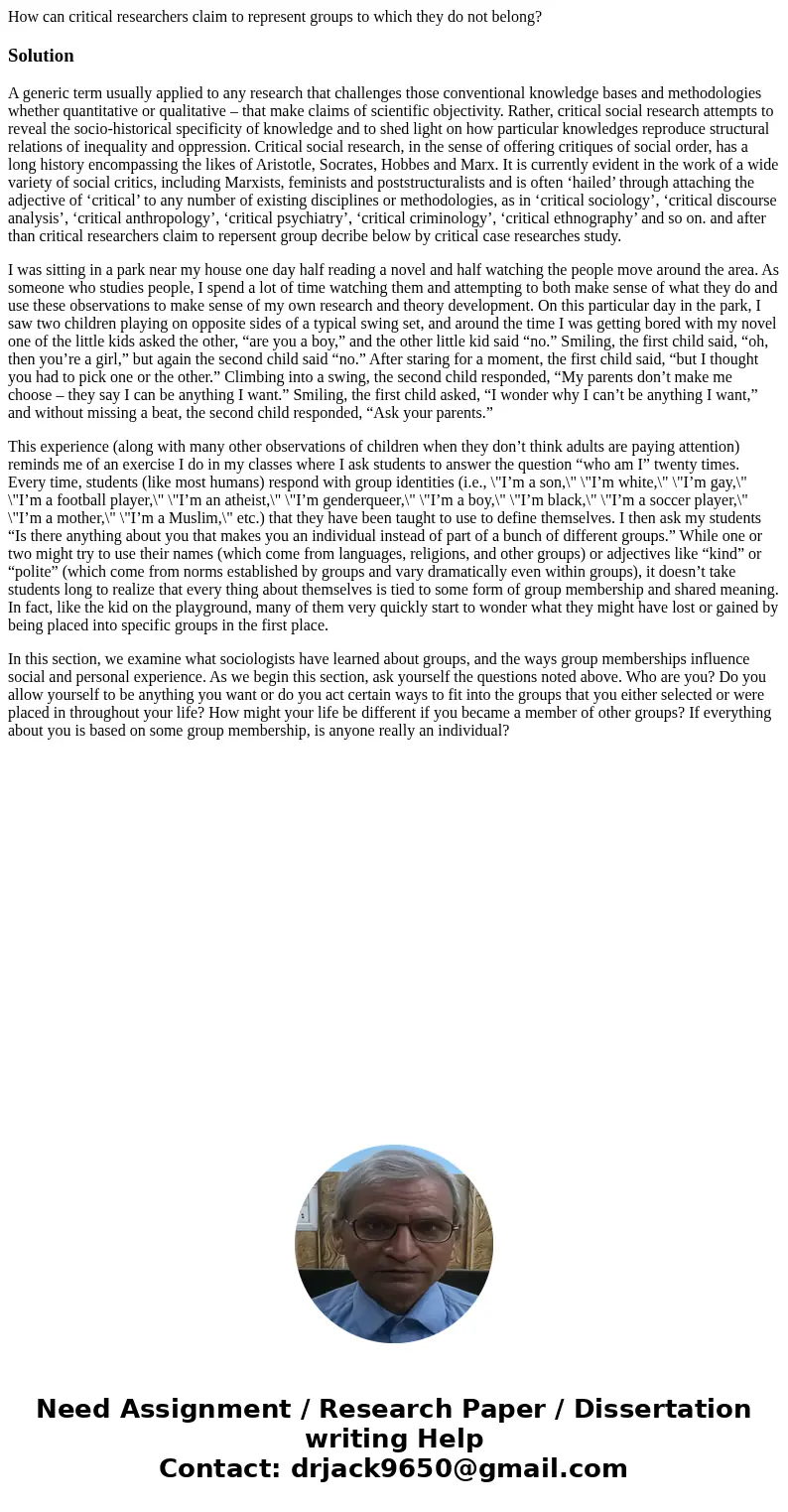How can critical researchers claim to represent groups to wh
How can critical researchers claim to represent groups to which they do not belong?
Solution
A generic term usually applied to any research that challenges those conventional knowledge bases and methodologies whether quantitative or qualitative – that make claims of scientific objectivity. Rather, critical social research attempts to reveal the socio-historical specificity of knowledge and to shed light on how particular knowledges reproduce structural relations of inequality and oppression. Critical social research, in the sense of offering critiques of social order, has a long history encompassing the likes of Aristotle, Socrates, Hobbes and Marx. It is currently evident in the work of a wide variety of social critics, including Marxists, feminists and poststructuralists and is often ‘hailed’ through attaching the adjective of ‘critical’ to any number of existing disciplines or methodologies, as in ‘critical sociology’, ‘critical discourse analysis’, ‘critical anthropology’, ‘critical psychiatry’, ‘critical criminology’, ‘critical ethnography’ and so on. and after than critical researchers claim to repersent group decribe below by critical case researches study.
I was sitting in a park near my house one day half reading a novel and half watching the people move around the area. As someone who studies people, I spend a lot of time watching them and attempting to both make sense of what they do and use these observations to make sense of my own research and theory development. On this particular day in the park, I saw two children playing on opposite sides of a typical swing set, and around the time I was getting bored with my novel one of the little kids asked the other, “are you a boy,” and the other little kid said “no.” Smiling, the first child said, “oh, then you’re a girl,” but again the second child said “no.” After staring for a moment, the first child said, “but I thought you had to pick one or the other.” Climbing into a swing, the second child responded, “My parents don’t make me choose – they say I can be anything I want.” Smiling, the first child asked, “I wonder why I can’t be anything I want,” and without missing a beat, the second child responded, “Ask your parents.”
This experience (along with many other observations of children when they don’t think adults are paying attention) reminds me of an exercise I do in my classes where I ask students to answer the question “who am I” twenty times. Every time, students (like most humans) respond with group identities (i.e., \"I’m a son,\" \"I’m white,\" \"I’m gay,\" \"I’m a football player,\" \"I’m an atheist,\" \"I’m genderqueer,\" \"I’m a boy,\" \"I’m black,\" \"I’m a soccer player,\" \"I’m a mother,\" \"I’m a Muslim,\" etc.) that they have been taught to use to define themselves. I then ask my students “Is there anything about you that makes you an individual instead of part of a bunch of different groups.” While one or two might try to use their names (which come from languages, religions, and other groups) or adjectives like “kind” or “polite” (which come from norms established by groups and vary dramatically even within groups), it doesn’t take students long to realize that every thing about themselves is tied to some form of group membership and shared meaning. In fact, like the kid on the playground, many of them very quickly start to wonder what they might have lost or gained by being placed into specific groups in the first place.
In this section, we examine what sociologists have learned about groups, and the ways group memberships influence social and personal experience. As we begin this section, ask yourself the questions noted above. Who are you? Do you allow yourself to be anything you want or do you act certain ways to fit into the groups that you either selected or were placed in throughout your life? How might your life be different if you became a member of other groups? If everything about you is based on some group membership, is anyone really an individual?

 Homework Sourse
Homework Sourse